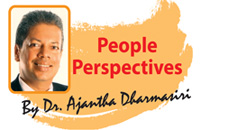Clarity on culture
 Culture consists of all transmitted social learning. It is the
acquired knowledge that people use to interpret experience and generate
social behaviour. In general, the term culture denotes the whole product
of a person, group or society of intelligent beings. Culture consists of all transmitted social learning. It is the
acquired knowledge that people use to interpret experience and generate
social behaviour. In general, the term culture denotes the whole product
of a person, group or society of intelligent beings.
Culture is often blamed for most of our wrong-doings. By the term
culture we fundamentally mix up two concepts, national culture and
organisational culture. Today's column will focus on the impact of
national culture on organisational performance, with emphasis on the Sri
Lankan scenario.
The term culture comes from the Latin cultura stemming from colere,
meaning 'to cultivate'. It generally refers to patterns of human
activity and the symbolic structures that give such activity
significance. Definitions of 'culture' reflect different theoretical
bases for understanding or criteria for evaluating, human activity.
Culture consists of all transmitted social learning. It is the
acquired knowledge that people use to interpret experience and generate
social behaviour. In general, the term culture denotes the whole product
of a person, group or society of intelligent beings.
It includes technology, art and science, and moral systems and the
characteristic behaviour and habits of selected intelligent entities. In
particular, it has specific and more detailed meanings in different
domains of human activity.
Dutch anthropologist Gert Hofstede conducted a classic study
(1980-2001) involving 53 national cultures. It shed much light on
understanding cultures. He analysed a large database of employee value
scores collected by IBM between 1967 and 1973 covering more than 70
countries, from which he first used the 40 largest only and later
extended the analysis to 50 countries and three regions.
In the editions of his work since 2001, scores are listed for 74
countries and regions. The details of the five key dimensions as
originally defined by him are:
This is the extent to which the less powerful members of
organisations and institutions (such as the family) accept and expect
that power is distributed unequally. This represents inequality (more
versus less), but defined from below, not from above.
 It suggests that a society's level of inequality is endorsed by
followers as much as by leaders. Power and inequality, of course, are
extremely fundamental facts of any society and anybody with some
international experience will be aware that 'all societies are unequal,
but some are more unequal than others'. It suggests that a society's level of inequality is endorsed by
followers as much as by leaders. Power and inequality, of course, are
extremely fundamental facts of any society and anybody with some
international experience will be aware that 'all societies are unequal,
but some are more unequal than others'.
Individualism vs collectivism
It means the degree to which people are integrated into groups. On
the individualist side, societies can be seen in which the ties between
people are loose: everyone is expected to look after himself or herself
and his or her immediate family.
On the collectivist side, societies are found in which people from
birth are integrated into strong, cohesive groups, often extended
families (with uncles, aunts and grandparents) which continue protecting
them in exchange for unquestioning loyalty.
The word 'collectivism' in this sense has no political meaning: it
refers to the group, not to the State. Again, the issue addressed by
this dimension is an extremely fundamental one relating to all societies
in the world.
Masculinity vs femininity
It refers to the distribution of roles between the genders, which is
another fundamental issue for any society in which a range of solutions
are found. The IBM studies revealed that (a) women's values differ less
among societies than men's values, (b) men's values from one country to
another contain a dimension from very assertive and competitive and
maximally different from women's values on the one side, to modest and
caring and similar to women's values on the other.
The assertive pole has been called 'masculine' and the modest, caring
pole 'feminine'. Women in feminine countries have the same modest,
caring values as men, in the masculine countries, they are somewhat
assertive and competitive, but not as much as men, so that these
countries show a gap between men's values and women's values.
Uncertainty avoidance: high vs low
It deals with a society's tolerance for uncertainty and ambiguity; it
ultimately refers to man's search for truth. It indicates to what extent
a culture programs its members to feel either uncomfortable or
comfortable in unstructured situations. Unstructured situations are
novel, unknown, surprising and different from the usual.
Uncertainty avoiding cultures try to minimise the possibility of such
situations by strict laws and rules, safety and security measures, and
on the philosophical and religious level by a belief in absolute truth;
'there can only be one Truth and we have it'. People in uncertainty
avoiding countries are also more emotional and motivated by inner
nervous energy.
The opposite type, uncertainty accepting cultures, are more tolerant
of opinions different from what they are used to. They try to have as
few rules as possible and on the philosophical and religious level they
are relativist and allow many currents to flow side by side. People
within these cultures are more phlegmatic and contemplative and not
expected by their environment to express emotions.
Long-term vs short-term orientation
This fifth dimension was found in a study among students in 23
countries, using a questionnaire designed by Chinese scholars.
It can be said to deal with Virtue regardless of Truth. Values
associated with long-term orientation are thrift and perseverance.
Values associated with short-term orientation are respect for tradition,
fulfilling social obligations and protecting one's 'face'.
The positively and the negatively rated values of this dimension are
found in the teachings of Confucius, the most influential Chinese
philosopher, who lived around 500 B.C. However, the dimension also
applies to countries without a Confucian heritage.
We are proud of our culture. At the same time, a conscious awareness
of the shortcomings associated with certain cultural practices needs to
be rectified. It is easier said than done.
As culture is 'collective mental programing', it takes time to
re-program with the right mindset.
Sri Lankan leaders have a challenging task ahead in building a
multi-religious, multi-ethnic and multi-skilled nation.
During such an endeavour, how would national culture impact
organisational culture? How can we foster a performance-driven culture?
What is the role of leaders in such an endeavour?
The next column of People Perspectives will address these aspects.
The writer is the Director of the Postgraduate Institute of
Management. He also serves as an Adjunct Professor in the Division of
Management and Entrepreneurship, Price College of Business, University
of Oklahoma, USA. |

